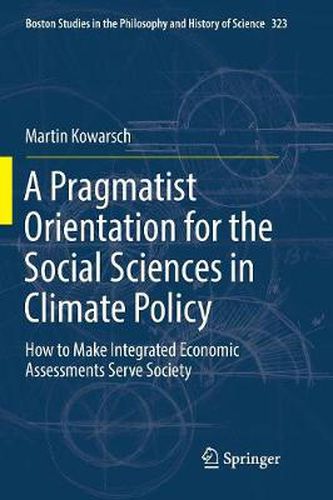Readings Newsletter
Become a Readings Member to make your shopping experience even easier.
Sign in or sign up for free!
You’re not far away from qualifying for FREE standard shipping within Australia
You’ve qualified for FREE standard shipping within Australia
The cart is loading…






This title is printed to order. This book may have been self-published. If so, we cannot guarantee the quality of the content. In the main most books will have gone through the editing process however some may not. We therefore suggest that you be aware of this before ordering this book. If in doubt check either the author or publisher’s details as we are unable to accept any returns unless they are faulty. Please contact us if you have any questions.
While economic and other social science expertise is indispensable for successful public policy-making regarding global climate change, social scientists face trade-offs between the scientific credibility, policy-relevance, and legitimacy of their policy advice. From a philosophical perspective, this book systematically addresses these trade-offs and other crucial challenges facing the integrated economic assessments of the Intergovernmental Panel on Climate Change (IPCC). Based on John Dewey’s pragmatist philosophy and an analysis of the value-laden nature and reliability of climate change economics, the book develops a refined science-policy model and specific guidelines for these assessments of climate policy options. The core idea is to scientifically explore the various practical implications of alternative climate policy pathways in an interdisciplinary manner, together with diverse stakeholders. This could facilitate an iterative, deliberative public learning process concerning disputed policy issues. This volume makes novel contributions to three strands of the literature: (1) the philosophy of (social) science in policy; (2) the philosophy of economics; and (3) debates about the design of scientific assessments, including the continuous IPCC reform debate. This work is thus interesting for philosophers and other scholars reflecting on the science-policy interface, but also for assessment practitioners, climate policy-makers, and economists. The science-policy approach developed in this volume has already influenced the recent socio-economic IPCC assessment.
$9.00 standard shipping within Australia
FREE standard shipping within Australia for orders over $100.00
Express & International shipping calculated at checkout
This title is printed to order. This book may have been self-published. If so, we cannot guarantee the quality of the content. In the main most books will have gone through the editing process however some may not. We therefore suggest that you be aware of this before ordering this book. If in doubt check either the author or publisher’s details as we are unable to accept any returns unless they are faulty. Please contact us if you have any questions.
While economic and other social science expertise is indispensable for successful public policy-making regarding global climate change, social scientists face trade-offs between the scientific credibility, policy-relevance, and legitimacy of their policy advice. From a philosophical perspective, this book systematically addresses these trade-offs and other crucial challenges facing the integrated economic assessments of the Intergovernmental Panel on Climate Change (IPCC). Based on John Dewey’s pragmatist philosophy and an analysis of the value-laden nature and reliability of climate change economics, the book develops a refined science-policy model and specific guidelines for these assessments of climate policy options. The core idea is to scientifically explore the various practical implications of alternative climate policy pathways in an interdisciplinary manner, together with diverse stakeholders. This could facilitate an iterative, deliberative public learning process concerning disputed policy issues. This volume makes novel contributions to three strands of the literature: (1) the philosophy of (social) science in policy; (2) the philosophy of economics; and (3) debates about the design of scientific assessments, including the continuous IPCC reform debate. This work is thus interesting for philosophers and other scholars reflecting on the science-policy interface, but also for assessment practitioners, climate policy-makers, and economists. The science-policy approach developed in this volume has already influenced the recent socio-economic IPCC assessment.